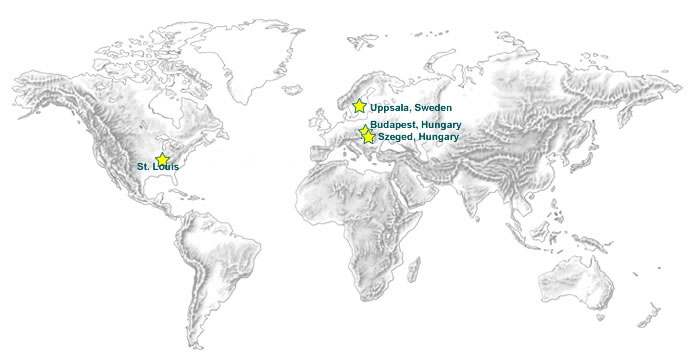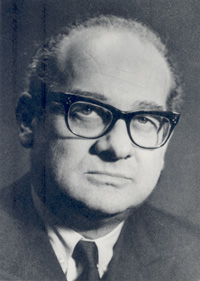Arpad I. Csapo (1918-1981)
Arpad I. Csapo was born in 1918 in Szeged, in southeastern Hungary. He studied medicine at the University of Szeged and received his M.D. there in 1943. Csapo took his residency training at the Semmelweis Medical University in Budapest. Contact with the biochemist Albert Szent-Gyorgyi (winner of the Nobel Prize in 1937 for discoveries concerning vitamin C and cellular oxidation) influenced him to follow a career in laboratory science. Szent-Gyorgyi employed the young researcher in his laboratory. Csapo succeeded in isolating actin and myosin, proteins responsible for contractible properties of muscle. This led in 1948 to Csapo being invited to the University of Uppsala in Sweden as a Mannheimer Fellow, where he refined his study of these proteins in the uterus.
From this point onward Csapo devoted his career to work in what he defined as “the qualitative physiology of uterine function.” In 1949 he accepted a fellowship with the Carnegie Institution in Baltimore as well as the position of lecturer in obstetrics at Johns Hopkins University School of Medicine. He collaborated with George W. Corner, who had worked with a student, the later Washington University professor Willard Allen, in discovering progesterone. Csapo became a U.S. citizen in 1953.
Csapo developed a series of experiments testing a theory that the hormone serves to block the contraction of muscles in the pregnant uterus. His work also identified that after the initial weeks of pregnancy in the human, the blocking action of the hormone progesterone shifts from the ovaries to the placenta. He further proved that the placental progesterone exerts its action on the uterus through a local mechanism, thus explaining why twins can be born several weeks apart. In 1956, the year in which Csapo published his initial “progesterone block” experiments, he joined the faculty of Rockefeller University as an associate professor. In 1961 he was promoted to head the Laboratory of the Physiology of Reproduction at that institution.
In 1963 he became Professor of Obstetrics and Gynecology at Washington University. Csapo’s initial findings concerning progesterone did not convince many leading specialists in the field. Debate raged in journals and among and within certain academic departments for over two decades, at times taking on an acerbic personal tone. Csapo by no means restricted his investigations to the functions of a single hormone, although he is perhaps best known for work in this area. In all, he published over two hundred articles and contributed chapters to several textbooks.
Related to the theory of “progesterone block” is the “seesaw theory of uterine function,” which Csapo published in 1975. In this, he stated that, during pregnancy, the fetus is protected by a balance between factors which promote uterine contraction, notably prostaglandin, and those which prohibit it, notably progesterone. The “seesaw theory” occasioned more vigorous discussion in the literature. By the end of the decade, Csapo had the satisfaction of seeing his findings accepted to the degree that they were incorporated into textbooks.
One significant aspect of Csapo’s work involved his efforts to promote international cooperation in uterine physiology research. From the 1950s onward he participated in various projects with Brazilian colleagues. Parts of his progesterone research were done in cooperation with specialists in Finland. A grant from the U.S. Department of State in 1973 funded an Advanced Technology Fertility Training Center at Washington University. For five years more than 300 physicians from 57 countries were trained in St. Louis under the grant in various aspects of fertility management.
In this last decade of his life Csapo was able to “rediscover” Hungary after nearly two decades abroad. During the 1970s he made frequent visits to his native country and invited Hungarian researchers to his laboratory in St. Louis. Csapo died in 1981. European colleagues commemorated his achievements in two international conferences held in 1983, including a posthumous award of the Michaelis Medallion, a prestigious German prize in obstetrics.

Related Resources:
Back to Biographies

